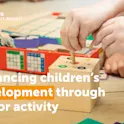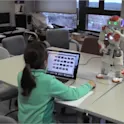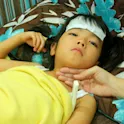
Psychology
05 Sep 2017
Inattentive kids show worse grades in later life
A study of young kids, published in Frontiers in Psychology, reveals that inattentiveness is linked to poor grades up to 10 years later.

Psychology
05 Sep 2017
A study of young kids, published in Frontiers in Psychology, reveals that inattentiveness is linked to poor grades up to 10 years later.

Neuroscience
29 Aug 2017
Researchers find evidence that traumatic brain injuries in children and adolescents could be a risk-factor for alcohol abuse in later life

Humanities
04 Jul 2017
Frontiers in Education study suggests finger training intervention combined with exposure to number representations supports quantitative skills development

Health
20 Jun 2017
A comprehensive literature review, published in Frontiers in Psychiatry, helps us to understand why childhood trauma leads to an increased risk for psychosis.

Psychology
15 May 2017
New study, published in Frontiers in Psychology, reveals that it’s not what a child does that leads to rejection, but how other children feel about it.

Psychology
09 May 2017
New research, published in Frontiers in Psychology, shows that touchscreens can either help or hinder learning in toddlers.

Psychology
08 May 2017
Research, published in Frontiers in Psychology, shows motor skills impact growth beyond physical health, such as language, math and social behavior.

Health
03 Mar 2017
Study shows how the effects of horseback riding improve learning in children.

Psychology
08 Dec 2016
Study shows learning strategies are key to academic achievement and describe behavioural interventions that could reverse underachievement – By Abigail Pattenden, Science Writer – Not all children do well in school, despite being intellectually capable. Whilst parental relationships, motivation and self-concept all have a role to play, a recent study published in the journal Frontiers in Psychology shows that children’s learning strategy is key for academic success. The study showed that students with normal scores on intellectual tests but that have poor grades in secondary school are also not as good at acquiring and retaining information, or later applying it. Lead researcher of the study and professor at the University of Alicante in Spain, Juan Castejón, concludes that underachieving students appear to employ all of the learning strategies considered, but to a lesser extent than normal and overachieving students, and this seems to be the key for academic success. “The underachievers group of students also has poorer attitudes to learning goals, poorer relationships with their parents, and lower emotional stability than their peers,” says Castejón, “but learning strategies showed the strongest relationship with achievement.” By comparing underachievers with normal- or over-achievers, the work brings new insight on how educational interventions […]

Neuroscience
04 Nov 2016
By Ian Salter, Frontiers Science Writer The use of robotic tutors in primary school classrooms is one step closer according to research recently published in the open access journal Frontiers in Computational Neuroscience. Dr Imbernòn Cuadrado and his co-workers at the Department of Artificial Intelligence in Madrid have developed an integrated computational architecture (ARTIE) for use with software applications in schools. “The main goal of our work was to design a system that can detect the emotional state of primary school children interacting with educational software and make pedagogic interventions with a robot tutor that can ultimately improve the learning experience,” says Luis Imbernòn Cuadrado. Online educational resources are becoming increasingly common in the classroom, although they have not taken into sufficient account that the learning ability of primary school children is particularly sensitive to their emotional state. This is perhaps where robot tutors can step in to assist teachers. Rather than focusing on specific emotions, the researchers first identified three cognitive states (concentrating, distracted and inactive) known to influence the course of learning. Keyboard strokes and mouse actions of children using educational software were used to predict which of these cognitive states the child is experiencing and subsequently linked […]

Life sciences
05 Oct 2016
A type of bacteria, which can cause diarrhea and inhibit growth in children in developing countries, is highly prevalent in a sample of children in an industrialized country.

Psychology
13 Sep 2016
by Conn Hastings, Frontiers Science Writer Younger use of touchscreens by toddlers correlates with increased fine motor control. Does your toddler use a touchscreen tablet? A recent study published in Frontiers in Psychology has shown that early touchscreen use, and in particular actively scrolling the screen, correlates with increased fine motor control in toddlers. Smartphones and tablets are now commonplace at work and in the home. If you are reading this on your morning commute on public transport, it is likely to be on a touchscreen device, while surrounded by people who are completely absorbed by their own touchscreens. There has been a dramatic increase in the ownership and use of tablets and smartphones in recent years. In the UK, family ownership of touchscreen devices increased from 7% in 2011 to 71% in 2014. It is therefore not surprising that children are using touchscreens from a very early age, but is this a good thing or not? The effects of using touchscreens on young children are a concern for some parents and policymakers. Popular opinion holds that using touchscreens at an early age is likely to delay the cognitive development of children. The American Academy of Pediatrics advises that […]

Neuroscience
07 Sep 2016
By Mark Wartenberg, Frontiers Science Writer Emotionally invested parents can mean children are more likely to be successful later in life, a study published in Frontiers in Human Neuroscience shows. Looking at 27 children aged between four and six, the study examined the quality of the emotional bond to their parents, and their cognitive control including: resisting temptation, their ability to remember things, and whether they are shy or withdrawn. Maximizing children’s chances of success can seem daunting and an impossibly tall order. This research found a caring and emotionally attentive environment is liable to be a long-term game-changer. The study involved a combination of questionnaires, behavioral tasks and electrophysiological measurements. The researchers looked at the quality of the emotional bond – referred to as emotional availability (EA) – between mothers and children. Second, the children’s executive functions were measured through a number of exercises. Finally, the study measured the neural responses of children who were tasked to inhibit certain aspects of their behavior. This was achieved through EEG (Electrotroencephalography) by measuring small variations in voltage in certain key parts of the brain. Dr Schneider-Hassloff, a researcher on the study, noted: “this study investigated the association between emotional interaction […]

Psychology
13 Jun 2016
A new study shows that children judge us on our looks – and beauty wins out on trustworthiness ratings by Abigail Pattenden, Frontiersin.org Is beauty only skin deep? Children don’t seem to think so, like adults and babies, children think the uglier you are, the less trustworthy you are. In a study recently published in Frontiers in Psychology, researchers have found that as children, how we perceive someone’s trustworthiness is linked to how attractive we find them. Our ability to make this trustworthiness judgement develops as we grow, becoming more consistent as we approach adulthood, and, girls are better at it than boys. Many psychology studies have proven the existence of the so-called “beauty stereotype”. This describes the phenomenon whereby more attractive people are also considered to be smarter, more sociable and more successful. To be attractive is to be treated better by your peers, and preferred by new-born babies, than uglier people. People use facial cues to make judgements on a person’s character – and this ability to infer social traits is a crucial part of social functioning and development. Although well researched in babies and adults, the development of this ability in children was not previously known. Understanding […]

Health
06 May 2016
By Alice Rolandini Jensen, Frontiers science writer Acute Respiratory Distress Syndrome (ARDS) affects hundreds of thousands of people each year, many of them children. Those with this life threatening condition have severely injured and wet lungs, and are treated with mechanical ventilation. Now, a study led by Professor Kanwaljeet Anand published in Frontiers in Pediatrics, investigates the effects of a new steroid treatment on children suffering from ARDS. “Over the last 20-30 years researchers have come up with novel therapies but have not been able to move the needle substantially in terms of reducing mortality of ARDS patients,” explains Professor Anand of Stanford University, USA. “In this work, we conducted the first-ever randomized control trial and saw clinical differences in children treated with steroids.” ARDS is a catch-all term associated with the inability of lung tissue to take up oxygen, the lungs become very stiff and are incapable of transferring oxygen into the blood. ARDS can occur following direct injury of the lungs, such as pneumonia, bronchiolitis, following inhalation of toxic gas and near drowning. It can also develop in patients with severe systemic illnesses. Understanding why ARDS occurs and the differences between mechanisms is key to being able to […]
Get the latest research updates, subscribe to our newsletter